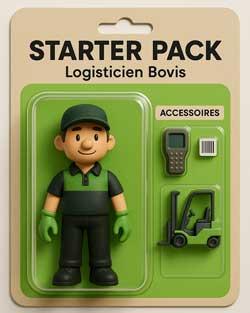 The Role of a Forklift Operator
The Role of a Forklift Operator
A forklift operator specializes in handling machinery for moving, loading, storing, and other operations. This is one of the most in-demand roles across industries and is highly sought after due to the accessibility and quick training process.
Synonyms: Warehouse Forklift Operator, Forklift Dock Agent, Warehouse Forklift Operator, Logistics Forklift Operator
Professional Sectors: Automotive, Heavy Industry, Logistics and Transport, Construction and Public Works
What is a Forklift Operator?
The primary responsibility of a forklift operator is managing merchandise stock, whether raw materials or finished goods.
To perform their duties, forklift operators use ride-on handling equipment (e.g., forklifts, stackers) for operations such as moving, loading, unloading, storing, retrieving, supplying, or removing loads. These loads, which may include goods, products, or equipment, must be handled in accordance with quality procedures, safety rules, and time constraints.
Forklift operators also carry out additional tasks related to warehouse or production site operations, such as receiving and inspecting products, managing stock, order preparation, and inventory.
What are the responsibilities of a Forklift Operator?
Key responsibilities include:
- Receiving/Shipping
- Inspecting, storing, and validating materials
- Making materials available for client pickup or delivery
- Communicating with clients about material availability
- Stocking materials at client sites or issuing storage orders at Bovis facilities
- Updating stock in the Bovis logistics management system
- Preparing and delivering orders in compliance with deadlines and control processes, as per client specifications and instructions from the Operations Manager or Site Manager
- Performing physical and digital inventory management
- Adhering to safety procedures in compliance with group protocols
What skills are required to become a Forklift Operator?
To excel as a forklift operator, one must possess both technical and personal skills, including:
- Selecting and preparing handling equipment based on product characteristics and movement conditions
- Unloading and loading goods and products
- Transporting goods to storage areas
- Organizing products or merchandise by expiration date and storage conditions
- Recording load movement data and transmitting it to the relevant department
- Inspecting loads, identifying anomalies, and reporting them to the appropriate service
- Performing basic maintenance
- Inspecting finished products
What qualifications are needed to become a Forklift Operator?
Forklift operators must be certified to operate handling and lifting equipment safely. This certification is known as the Certificate of Aptitude for Safe Driving (CACES®).
The two main CACES® certifications for forklift operators are:
- CACES® R489: Required for safely operating ride-on powered industrial trucks (forklifts). This certification is issued by an authorized certifying body upon successful completion of theoretical and practical training.
- CACES® R485: Required for safely operating a pedestrian stacker. This certification is also issued by an authorized certifying body following successful training.
What are the career prospects for a Forklift Operator?
At Bovis, we are always looking for motivated and talented individuals to join our teams, with opportunities to grow into positions such as Head Warehouseman or Warehouse Manager.
If this career excites you, explore our job openings today and embark on a path focused on technical performance and excellence!